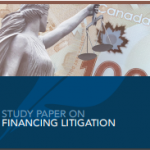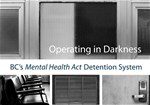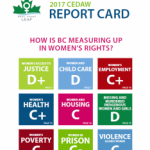2017 Bi-Monthly Update Series: November/December
To keep you informed, here are some highlights of changes and updates made to Clicklaw in November and December:
Jan-Feb | Mar-Apr | May-Jun | Jul-Aug | Sep-Oct | Nov-Dec
 Gladue Submission Guide
Gladue Submission Guide
This new, plain language booklet for Aboriginal peoples explains how to prepare a Gladue submission to help the judge decide bail or sentencing. Includes a Gladue factors checklist and a worksheet to help Aboriginal peoples, lawyers, and Native courtworkers gather information needed to prepare a submission.- Your Gladue Rights
This revised booklet explains Gladue rights, rights under the Criminal Code that apply to anyone who identifies as Aboriginal. Gladue rights can apply at bail and sentencing hearings. - Sponsorship Breakdown
This updated booklet is for permanent residents who need help when the person sponsoring them in Canada is no longer supporting them.
 CFCSA flowchart (Child Protection Matters)
CFCSA flowchart (Child Protection Matters)
Chart shows possible stages and orders in child protection proceedings under the Child, Family and Community Service Act, with notes – statute sections are hyperlinked to the Act.- Criminal Case Flowchart
Stages in a Criminal Case: These notes provide more information about criminal procedure – the procedures set out in the Criminal Code of Canada to be followed in criminal cases. - BC Provincial Court Common Questions
General information about the Provincial Court and the BC justice system.
Disability Alliance BC Help Sheets Update
The following help sheets on BC’s disability benefits have been updated:
Health Supplements for People with Disabilities
- Rate Amounts for Persons with Disabilities (PWD) and Persons with Persistent and Multiple Barriers to Employment (PPMB) Benefits
Small Claims Trial Preparation Clinic
by Seniors First BC

Mothers Without Status
by YWCA Vancouver
 This updated booklet is for service providers assisting “mothers without status”. It now has new content on MCFD and has been updated for immigration and Family Law Act changes.
This updated booklet is for service providers assisting “mothers without status”. It now has new content on MCFD and has been updated for immigration and Family Law Act changes.
 Financing Litigation Legal Research Project
Financing Litigation Legal Research Project
by British Columbia Law Institute (BCLI)
The paper reviews six financing models to pay for litigation: unbundled legal services, third-party litigation funding, alternative fee arrangements, crowdfunding, legal expense insurance, and publicly funded litigation funds. It also discusses 18 ideas on how to enhance the use of each model.
Operating in Darkness: BC’s Mental Health Act Detention System
by Community Legal Assistance Society (CLAS)
 Mental health detentions in BC have increased dramatically over the last ten years. This report reveals several disturbing practices and points to a number of deep flaws in the BC Mental Health Act that do not comply with the rights guaranteed by the Charter and international human rights law.
Mental health detentions in BC have increased dramatically over the last ten years. This report reveals several disturbing practices and points to a number of deep flaws in the BC Mental Health Act that do not comply with the rights guaranteed by the Charter and international human rights law.
2017 CEDAW Report Card
by West Coast LEAF
 The annual CEDAW Report Card grades BC’s compliance with United Nations Convention on the Elimination of All Forms of Discrimination against Women (CEDAW). BC’s record of action and inaction in the past year is assessed in nine key areas impacting the rights of women and girls.
The annual CEDAW Report Card grades BC’s compliance with United Nations Convention on the Elimination of All Forms of Discrimination against Women (CEDAW). BC’s record of action and inaction in the past year is assessed in nine key areas impacting the rights of women and girls.
The National Self-Represented Litigants Project
 Navigating the Justice System: A Guide for Self-Represented Litigants with Disabilities
Navigating the Justice System: A Guide for Self-Represented Litigants with Disabilities
This guide is for self-represented litigants (SRLs) who are also people with disabilities (PWDs). It provides information on disability accommodations and resources in the justice system. It includes a list of organizations that may be able to help.- Reading and Understanding Case Reports: A Guide for Self-Represented Litigants
This guide helps self-represented litigants (SRLs) with reading case reports. It gives advice to SRLs on how to read and use case law in their legal research and is a companion to the CanLII primer. It also includes a glossary of important terms and a list of court abbreviations.
Charterpedia
by the Government of Canada
 Charterpedia provides legal info about the Charter and contains information about the purpose of each section of the Charter, the analysis or test developed through case law in respect of the section, and any particular considerations related to it. Each Charterpedia entry cites relevant case law.
Charterpedia provides legal info about the Charter and contains information about the purpose of each section of the Charter, the analysis or test developed through case law in respect of the section, and any particular considerations related to it. Each Charterpedia entry cites relevant case law.
Canadian Research Institute for Law and the Family
 Children’s Participation in Justice Processes
Children’s Participation in Justice Processes
The final results of survey of participants from a 2-day national symposium with a multidisciplinary spectrum of leading stakeholders to share info & dialogue about how: voices of children and youth are heard, their interests are protected & evidence is received in justice proceedings.- The Development of Parenting Coordination and an Examination of Policies and Practices in Ontario, British Columbia and Alberta
A review of the development of parenting coordination in the US & its adoption in Canada, and the findings of the research available to date on parenting coordination, its efficacy in resolving parenting disputes, its efficacy in steering such disputes out of court & its impact on parental conflict.
 at CLAS. Samrah acts as the first point of contact for all clients and advocates accessing the Community Law Program’s services. She listens to their stories, gleans relevant information, helps clients gather documents from various sources in order to complete a program intake, and links clients and callers to other resources and referrals when appropriate. She also plays a role in community outreach, public legal education and research, and works towards program goals surrounding residential tenancy.
at CLAS. Samrah acts as the first point of contact for all clients and advocates accessing the Community Law Program’s services. She listens to their stories, gleans relevant information, helps clients gather documents from various sources in order to complete a program intake, and links clients and callers to other resources and referrals when appropriate. She also plays a role in community outreach, public legal education and research, and works towards program goals surrounding residential tenancy. Besides providing direct services to hundreds of people every year, we’re involved in a number of systemic advocacy actions.
Besides providing direct services to hundreds of people every year, we’re involved in a number of systemic advocacy actions.


